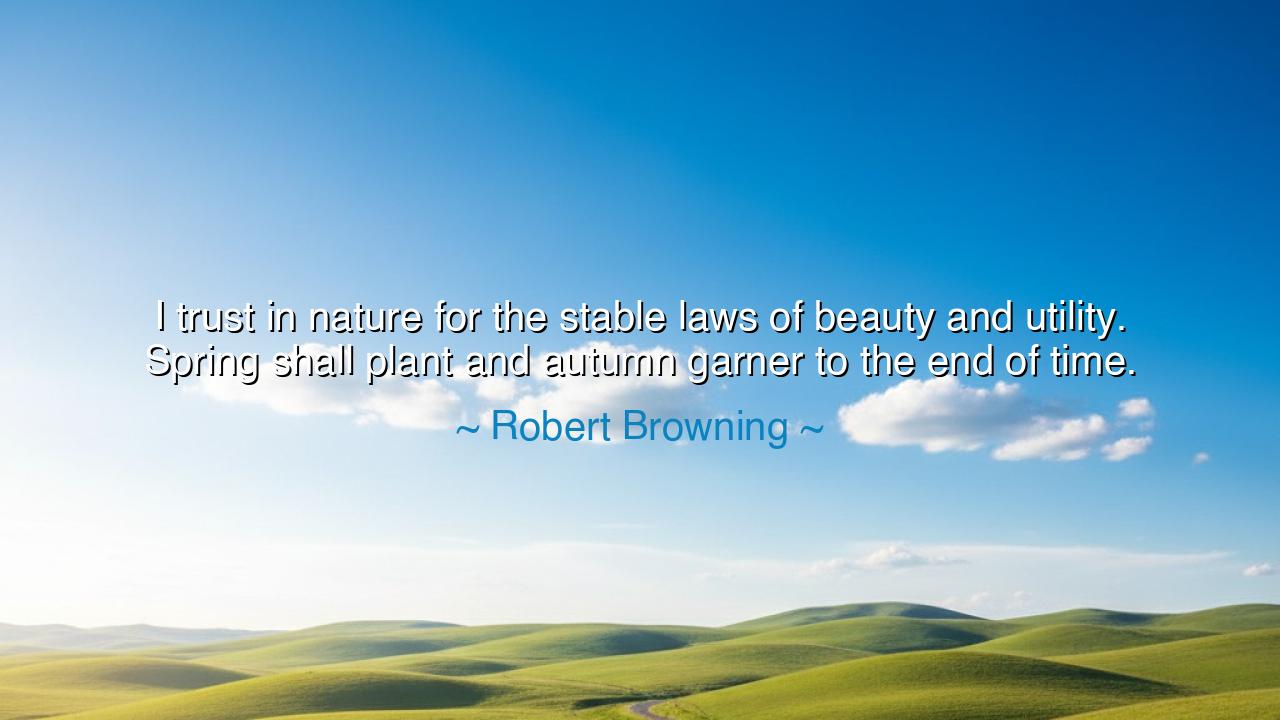
I trust in nature for the stable laws of beauty and utility.
I trust in nature for the stable laws of beauty and utility. Spring shall plant and autumn garner to the end of time.






In the words of Robert Browning, poet of depth and vision, there shines an eternal wisdom: “I trust in nature for the stable laws of beauty and utility. Spring shall plant and autumn garner to the end of time.” This utterance is not a mere observation of seasons, but a hymn to the eternal order that governs both the earth and the human spirit. Browning reminds us that beneath the chaos of men, beneath the storms of empires and the vanities of kings, there is a rhythm older than history—a law written not by hands, but by the breath of creation itself.
To trust in nature is to bow before this eternal law. Men may betray, kingdoms may crumble, the works of human pride may collapse into dust, but the rising of spring and the harvest of autumn remain unbroken. These cycles reveal not only utility, the sustenance of life, but also beauty, the harmony that gives the soul its delight. For in the budding of blossoms and the ripening of grain, we see that nature provides both food for the body and wonder for the spirit. Thus, the poet teaches us that the true foundation of trust lies not in the uncertain whims of men, but in the stable promises of the earth.
Consider the history of ancient Egypt. For thousands of years, its people looked not to kings nor generals for their ultimate hope, but to the yearly flooding of the Nile. That sacred rhythm of waters, bringing silt and fertility, was the pulse upon which civilization itself was built. The pharaohs may have proclaimed themselves gods, but all Egypt knew that their survival depended upon the eternal faithfulness of the river. Just as Browning declares, they trusted in nature, for it gave both utility in crops and beauty in the verdant fields that stretched from desert to horizon.
This truth is also reflected in the wisdom of the farmer. A farmer may toil, but he does not command the spring to sprout nor the autumn to ripen. He trusts. His labor is a covenant with the earth, a faith that the laws which governed the seasons before his birth will continue long after his bones return to the soil. In every seed planted, there is both hope and humility—hope that it will grow, and humility in knowing that he is not the master, but the partner of nature’s rhythm. Here again, Browning’s words shine: spring shall plant, autumn shall garner, and man is invited to walk in step with this eternal procession.
Yet Browning speaks not only of earth, but of the soul. The spring of the spirit is youth, when ideas sprout and passions bloom. The autumn is the season of wisdom, when experiences are gathered and the fruits of labor are harvested. The wise man trusts that each season of life has its law, its utility, its beauty. To despair in winter is folly, for spring shall surely return; to waste the harvest is madness, for autumn comes but once each year. Thus, the poet whispers that life itself follows nature’s rhythm, and we are at peace when we walk in harmony with its seasons.
The lesson, therefore, is one of both humility and hope. Do not place your trust in fleeting fashions, unstable fortunes, or the vanity of human schemes. Place it instead in what is enduring: the stable laws of creation, the cycles that govern both land and life. Recognize beauty where it blossoms, honor utility where it sustains, and know that both are gifts not of man’s invention, but of the eternal order.
In practice, this means three things: cultivate patience, for spring cannot be hurried; honor diligence, for autumn rewards only those who have sown; and embrace gratitude, for beauty and utility alike are woven freely into the fabric of the world. Trust that your life, like the earth, has its rhythm, and do not despair in barren times, for abundance waits beyond the turning of the seasons.
Thus, Browning’s words resound like a psalm of the ages: “I trust in nature for the stable laws of beauty and utility.” Let us hold fast to this trust, for while men’s kingdoms rise and fall, spring shall plant and autumn shall garner to the end of time. And in that faith, we find both strength for our labor and peace for our souls.






AAdministratorAdministrator
Welcome, honored guests. Please leave a comment, we will respond soon